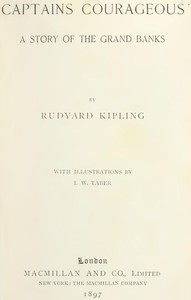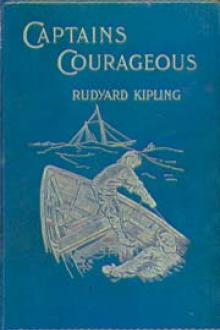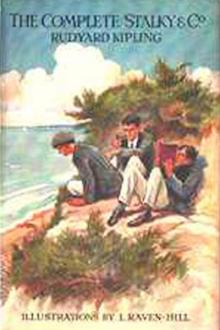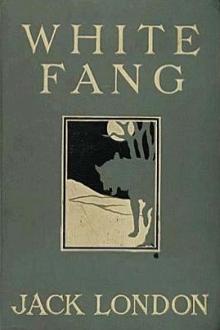"Captains Courageous": A Story of the Grand Banks by Rudyard Kipling (books for 6 year olds to read themselves txt) 📗

- Author: Rudyard Kipling
Book online «"Captains Courageous": A Story of the Grand Banks by Rudyard Kipling (books for 6 year olds to read themselves txt) 📗». Author Rudyard Kipling
"We're singin' to kape our breakfasts down. Ye'll lead, av course, Disko," said Long Jack.
"Guess there ain't more'n 'baout two old songs I know, an' ye've heerd them both."
His excuses were cut short by Tom Platt launching into a most dolorous tune, like unto the moaning of winds and the creaking of masts. With his eyes fixed on the beams above, Disko began this ancient, ancient ditty, Tom Platt flourishing all round him to make the tune and words fit a little:
"There is a crack packet—crack packet o' fame, She hails from Noo York, an' the Dreadnought's her name. You may talk o' your fliers—Swallow-tail and Black Ball— But the Dreadnought's the packet that can beat them all. "Now the Dreadnought she lies in the River Mersey, Because of the tugboat to take her to sea; But when she's off soundings you shortly will know (Chorus.) She's the Liverpool packet—O Lord, let her go! "Now the Dreadnought she's howlin' 'crost the Banks o' Newfoundland, Where the water's all shallow and the bottom's all sand. Sez all the little fishes that swim to an' fro: (Chorus.) 'She's the Liverpool packet—O Lord, let her go!'"There were scores of verses, for he worked the Dreadnought every mile of the way between Liverpool and New York as conscientiously as though he were on her deck, and the accordion pumped and the fiddle squeaked beside him. Tom Platt followed with something about "the rough and tough McGinn, who would pilot the vessel in." Then they called on Harvey, who felt very flattered, to contribute to the entertainment; but all that he could remember were some pieces of "Skipper Ireson's Ride" that he had been taught at the camp-school in the Adirondacks. It seemed that they might be appropriate to the time and place, but he had no more than mentioned the title when Disko brought down one foot with a bang, and cried, "Don't go on, young feller. That's a mistaken jedgment—one o' the worst kind, too, becaze it's catchin' to the ear."
"I orter ha' warned you," said Dan. "Thet allus fetches dad."
"What's wrong?" said Harvey, surprised and a little angry.
"All you're goin' to say," said Disko. "All dead wrong from start to finish, an' Whittier he's to blame. I have no special call to right any Marblehead man, but 'tweren't no fault o' Ireson's. My father he told me the tale time an' again, an' this is the way 'twuz."
"For the wan hundreth time," put in Long Jack, under his breath.
"Ben Ireson he was skipper o' the Betty, young feller, comin' home frum the Banks—that was before the war of 1812, but jestice is jestice at all times. They f'und the Active o' Portland, an' Gibbons o' that town he was her skipper; they f'und her leakin' off Cape Cod Light. There was a terr'ble gale on, an' they was gettin' the Betty home's fast as they could craowd her. Well, Ireson he said there warn't any sense to reskin' a boat in that sea; the men they wouldn't hev it; and he laid it before them to stay by the Active till the sea run daown a piece. They wouldn't hev that either, hangin' araound the Cape in any sech weather, leak or no leak. They jest up stays'l an' quit, nat'rally takin' Ireson with 'em. Folks to Marblehead was mad at him not runnin' the risk, and becaze nex' day, when the sea was ca'am (they never stopped to think o' that), some of the Active's folk was took off by a Truro man. They come into Marblehead with their own tale to tell, sayin' how Ireson had shamed his town, an' so forth an' so on; an' Ireson's men they was scared, seem' public feelin' ag'in' 'em, an' they went back on Ireson, an' swore he was respons'ble for the hull act. 'Tweren't the women neither that tarred and feathered him—Marblehead women don't act that way—'twas a passel o' men an' boys, an' they carted him araound town in an old dory till the bottom fell aout, an' Ireson he told 'em they'd be sorry for it some day. Well, the facts came aout later, same's they usually do, too late to be any ways useful to an honest man; an' Whittier he come along an' picked up the slack eend of a lyin' tale, an' tarred and feathered Ben Ireson all over onct more after he was dead. 'Twas the only time Whittier ever slipped up, an' 'tweren't fair. I whaled Dan good when he brought that piece back from school. You don't know no better, o' course; but I've give you the facts, hereafter an' evermore to be remembered. Ben Ireson weren't no sech kind o' man as Whittier makes aout; my father he knew him well, before an' after that business, an' you beware o' hasty jedgments, young feller. Next!"
Harvey had never heard Disko talk so long, and collapsed with burning cheeks; but, as Dan said promptly, a boy could only learn what he was taught at school, and life was too short to keep track of every lie along the coast.
Then Manuel touched the jangling, jarring little machette to a queer tune, and sang something in Portuguese about "Nina, innocente!" ending with a full-handed sweep that brought the song up with a jerk. Then Disko obliged with his second song, to an old-fashioned creaky tune, and all joined in the chorus. This is one stanza:
"Now Aprile is over and melted the snow, And outer Noo Bedford we shortly must tow; Yes, out o' Noo Bedford we shortly must clear, We're the whalers that never see wheat in the ear."Here the fiddle went very softly for a while by itself, and then:
"Wheat-in-the-ear, my true-love's posy blowin'; Wheat-in-the-ear, we're goin' off to sea; Wheat-in-the-ear, I left you fit for sowin'; When I come back a loaf o' bread you'll be!"That made Harvey almost weep, though he could not tell why. But it was much worse when the cook dropped the potatoes and held out his hands for the fiddle. Still leaning against the locker door, he struck into a tune that was like something very bad but sure to happen whatever you did. After a little he sang in an unknown tongue, his big chin down on the fiddle-tail, his white eyeballs glaring in the lamplight. Harvey swung out of his bunk to hear better; and amid the straining of the timbers and the wash of the waters the tune crooned and moaned on, like lee surf in a blind fog, till it ended with a wail.
"Jimmy Christmas! Thet gives me the blue creevles," said Dan.
"What in thunder is it?"
"The song of Fin McCoul," said the cook, "when he wass going to Norway." His English was not thick, but all clear-cut, as though it came from a phonograph.
"Faith, I've been to Norway, but I didn't make that unwholesim noise. 'Tis like some of the old songs, though," said Long Jack, sighing.
"Don't let's hev another 'thout somethin' between," said Dan; and the accordion struck up a rattling, catchy tune that ended:
"It's six an' twenty Sundays sence las' we saw the land, With fifteen hunder quintal, An' fifteen hunder quintal, 'Teen hunder toppin' quintal, 'Twix' old 'Queereau an' Grand!""Hold on!" roared Tom Plait "D'ye want to nail the trip, Dan? That's Jonah sure, 'less you sing it after all our salt's wet."
"No, 'tain't. Is it, dad? Not unless you sing the very las' verse. You can't learn me anything on Jonahs!"
"What's that?" said Harvey. "What's a Jonah?"
"A Jonah's anything that spoils the luck. Sometimes it's a man—sometimes it's a boy—or a bucket. I've known a splittin'-knife Jonah two trips till we was on to her," said Tom Plait. "There's all sorts o' Jonahs. Jim Bourke was one





Comments (0)